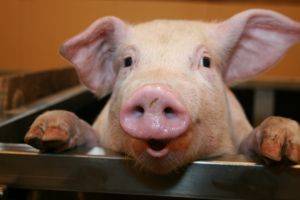- Antibiotics Tests in Milk
- Inhibitory detection test
- Laboratory equipment
- Centrifuges
- Indicator strips
- Autoclaves
- Scales
- Thermometers
- Packing
- PureTrust ATP monitoring
- ATP monitoring PIONEERPRODUKT CleanTrust
- MICROFAST® substrates
- Nutrient media
- Ice cream sticks
- Consumables
- Detergents and disinfectants
- Treatment agent
- Milk filters
- Wipes
- Gloves
- Sampling
Abandoning animal husbandry will not save the environment - Australian scientists
The researchers were investigating whether moving away from pastoralism is indeed a solution to the problem of emissions and has the potential to reduce emissions. As part of the project, scientists compared emissions from animals in the savannah (Serengeti region of Tanzania), which is dominated by wild herbivores, with emissions from adjacent areas that have similar ecological characteristics but are used for raising cattle.
it turned out that the obtained indicators do not have significant differences. In this regard, scientists raise the question of the appropriateness of classifying emissions from cattle as "anthropogenic factors". They argue that where livestock occupies an area that would otherwise be occupied by wild herbivores, the emissions produced should be attributed to the ecosphere and not be considered a factor of anthropogenic influence.
Currently, more than 100 countries are participating in the UN program to drastically reduce greenhouse gas emissions. These obligations include the abandonment of livestock grazing on large pastures and the "restoration of wildlife" in these areas.
However, according to the publication, a growing body of research shows that moving away from controlled use of pastures by livestock farmers will not lead to a significant reduction in total direct greenhouse gas emissions from animals. This is due to the fact that with a high degree of probability this niche will be occupied by wild herbivores, which produce as much or even more methane than farm animals.
 Rapid tests for determining the residual amount of tetracyclines in meat
Rapid tests for determining the residual amount of tetracyclines in meat Rapid 4 in 1 tests for determining the residual amount of neomycin, kanamycin, gentamicin, spectinomycin in milk, whey
Rapid 4 in 1 tests for determining the residual amount of neomycin, kanamycin, gentamicin, spectinomycin in milk, whey ANTIBIOTICS / ELISA TESTS
ANTIBIOTICS / ELISA TESTS PIONEER MEIZHENG BIO-TECH (5 in1) JC1165 / Rapid tests for the determination of the residual amount of halofuginone, flavomycin, novobiocin, flunixin, dexamethasone / prednisolone in milk, whey
PIONEER MEIZHENG BIO-TECH (5 in1) JC1165 / Rapid tests for the determination of the residual amount of halofuginone, flavomycin, novobiocin, flunixin, dexamethasone / prednisolone in milk, whey PIONEER MEIZHENG BIO-TECH (5 in 1) JC0726 / Rapid tests for determining the residual amount of Bacitracin, ansamycins, clindamycin, spiramycin, florfenicol in milk, whey
PIONEER MEIZHENG BIO-TECH (5 in 1) JC0726 / Rapid tests for determining the residual amount of Bacitracin, ansamycins, clindamycin, spiramycin, florfenicol in milk, whey PIONEER MEIZHENG BIO-TECH (5 in1) JC0586 - Antibiotic tests 5 in 1 / Rapid tests for determining the residual amount of β-lactams, tetracyclines and cephalexin in milk, whey
PIONEER MEIZHENG BIO-TECH (5 in1) JC0586 - Antibiotic tests 5 in 1 / Rapid tests for determining the residual amount of β-lactams, tetracyclines and cephalexin in milk, whey- Express tests for determining the residual amount of β-lactams and tetracyclines in milk, whey
- Rapid tests for determining the residual amount of chloramphenicol in meat
- Rapid tests for fluoroquinolone, erythromycin, lincomycin, tillosin and tilmycosin residues in milk, whey
- Express tests for determining the residual amount of β-lactams, tetracyclines, chloramphenicol, streptomycins in milk, whey
 Indicator strips "NS-Chlorine", 25 pcs.
Indicator strips "NS-Chlorine", 25 pcs. Laboratory hotplate Rommelsbacher CT 2203/TC
Laboratory hotplate Rommelsbacher CT 2203/TC Tagler BVR-18 water-reducer bath (Russia)
Tagler BVR-18 water-reducer bath (Russia) Milk quality analyzer "Laktan 1-4M" isp. Mini
Milk quality analyzer "Laktan 1-4M" isp. Mini Hourglass
Hourglass Staff table BA-CL- X.X SLP TR - a
Staff table BA-CL- X.X SLP TR - a- Indicator strips "NS-iron", 25 pcs.
- Laboratory heating plate PL-01
- EV series heaters
- Analyzer for somatic cell counting "Expert Somatos"
- Blade Homogenizer MicroBio BA400
- Laboratory table on supporting pedestal BA-CL-X.X SLv-t TR -a
- Milk quality analyzer "Laktan 1-4M" 500 isp. MINI
- Butyrometers for milk, cream, skim milk and buttermilk
- Navigator NV222 mastoprim weighing scale, (220 g, 0.01 g, external calibration)
 Backed Foil
Backed Foil Ice cream chopsticks
Ice cream chopsticks Plastic packaging for cakes and pastries
Plastic packaging for cakes and pastries Skiving and Hemming Technology
Skiving and Hemming Technology KH PACK® Straight Packing Paper
KH PACK® Straight Packing Paper Cover
Cover- KH PACK® bag making paper
- Carton
- Salad dressings
- KH PACK® tartlet paper
- Korreks for desserts
- Siliconized paper for hygiene products
- Parchment
- The paper packing fastened anticorrosive UNIK 14-70 THAT 5453-003-05773103-2005
- Paper for micro-ribbed
 Wafer cup and cone
Wafer cup and cone Pepsin whey pork
Pepsin whey pork Auxiliaries for sugar products
Auxiliaries for sugar products Cartons for milk and dairy products
Cartons for milk and dairy products GableTop aseptic packaging
GableTop aseptic packaging J-Bottom technology
J-Bottom technology- Petri dish 90 mm
- Ice cream sticks Standard 114
- Ice cream sticks (round)
- Ice cream sticks (with logo)
- Ice cream sticks Magnum (curly)
- General purpose environment of SPC "Biocompass-S" (Uglich)
- Ice cream sticks Standard 93
 Sticky fly trap, 25cm*10m
Sticky fly trap, 25cm*10m Dosing syringe, bottle attachment
Dosing syringe, bottle attachment Forged pitchforks
Forged pitchforks Pump for artificial ventilation of the lungs
Pump for artificial ventilation of the lungs Liquid soap "Prestige" (yellow, green, red) 5 l
Liquid soap "Prestige" (yellow, green, red) 5 l Cassettes for DCC somatic cell counter
Cassettes for DCC somatic cell counter- Disinfectant with washing effect (10kg)
- Pre-milking udder cleaner (20 l)
- Foam cup for udder treatment
- Spatula for mastitis test (Shalm's test)
- Pencils for marking animals
- Rubber rings for castration
- Foaming cup for udder treatment
- Hoof bath
- Latex gloves (long cuff with roller), (color blue, pack of 50 pieces)
 MicroFast® Microbiological Substrates
MicroFast® Microbiological Substrates Substrate for accelerated determination of QMAFAnM, (catalog number LR1321)
Substrate for accelerated determination of QMAFAnM, (catalog number LR1321) MicroFast® Bacillus cereus Count Plate (catalog number LR1010)
MicroFast® Bacillus cereus Count Plate (catalog number LR1010) MicroFast® Enterobacteriaceae Count Plate (cat. no. LR1011)
MicroFast® Enterobacteriaceae Count Plate (cat. no. LR1011) MicroFast® Lactic Acid Bacteria Count Plate (Part Number LR1312)
MicroFast® Lactic Acid Bacteria Count Plate (Part Number LR1312) MicroFast® Coliform & E.coli Count Plate
MicroFast® Coliform & E.coli Count Plate- Substrate for determining QMAFAnM (catalog number LR1001)
- Yeast & Mold Count Plate (cat. no. LR1003) MicroFast® Yeast & Mold Count Plate
- MicroFast® Salmonella Count Plate (SAL), for the determination of Salmonella in food and environmental samples (Catalog #LR1006)
- Coliform Count Plate (catalog number LR1002) MicroFast® Coliform Count Plate
- MicroFast® Staphyloccocus aureus Confirmation Plate Staph.aureus Confirmation Plate (cat. no. LR1005Q)
- MicroFast® Environmental Listeria Count Plate
- Substrate for determining the number of staphylococci (Catalog number LR1005) MicroFast® Staphyloccocus aureus Count Plate
 Первые в центральном регионе. Узнали, какой каравай зерновых собрали в этом сезоне в ОАО "Гастелловское" 03.10.2025
Первые в центральном регионе. Узнали, какой каравай зерновых собрали в этом сезоне в ОАО "Гастелловское" 03.10.2025 Калининградская область заинтересована в обмене опытом с Беларусью в мелиорации и закупке техники01.10.2025
Калининградская область заинтересована в обмене опытом с Беларусью в мелиорации и закупке техники01.10.2025 Belarusian exports of dry milk products to Myanmar quadrupled in the first half of the year. 01.10.2025
Belarusian exports of dry milk products to Myanmar quadrupled in the first half of the year. 01.10.2025- В ОАО "Агро-Колядичи" умеют получать завидные урожаи30.09.2025
- "Россь" не рассчитывает на авось30.09.2025
- Куда инвестирует бизнес? Узнали, какой город в Беларуси выбрал для вложений производитель протеиновых батончиков30.09.2025
- БУТБ обеспечит платформу для взаимодействия белорусского и индонезийского бизнеса28.09.2025
- В ОАО "Святая Воля" в Ивацевичском районе за полгода выручка на каждого работника составила Br98 тыс.27.09.2025
- Газ на пятилетку, вторая АЭС, защита общего рынка и Украина. Подробности переговоров Лукашенко и Путина27.09.2025
- Record-breaking animals are being raised at the Ross breeding farm in the Volkovysk district.26.09.2025
- Шашлычок, мясные шарики, гуляш, борщ. Посмотрели, чем кормят детей в школе и сколько это стоит26.09.2025
- At OJSC "Svyataya Volya" in the Ivatsevichi district, revenue per employee over the past six months amounted to Br98 thousand.26.09.2025
- OAO Ostromechevo invested over $18 million in livestock development.26.09.2025
- Farmers at Rogoznyansky JSC in Zhabinka District increased their grain yields by more than a third.25.09.2025
- В ОАО "Агро-Колядичи" самой урожайной культурой оказался ячмень25.09.2025
- Алтайский край заинтересован в развитии биржевой торговли с Беларусью25.09.2025
 В Алтайском крае наблюдается уменьшение поголовья скота при росте молочного производства03.10.2025
В Алтайском крае наблюдается уменьшение поголовья скота при росте молочного производства03.10.2025 Красноярский край выделяет 60 миллионов рублей на поддержку аграриев для покупки племенных животных03.10.2025
Красноярский край выделяет 60 миллионов рублей на поддержку аграриев для покупки племенных животных03.10.2025 Чили — второй по величине рынок бразильской свинины03.10.2025
Чили — второй по величине рынок бразильской свинины03.10.2025- Испания остаётся ведущим производителем комбикормов в Европе03.10.2025
- В сентябре Россельхознадзор проконтролировал 82 тысячи тонн продукции животноводства в Московском регионе03.10.2025
- Рост сельхозпроизводства в августе: увеличение на 6,1% по сравнению с июлем03.10.2025
- Новый федеральный проект по поддержке малого агробизнеса: инвестиции и развитие сельских территорий03.10.2025
- Снижение объемов реализации сельхозпродукции в России за 2025 год: изменения и тенденции03.10.2025
- ПРОДО Омский Бекон запускает новый участок опороса с высокой производительностью03.10.2025
- Ростовская область экспортировала в Грузию новую партию свиней на убой03.10.2025
- Революция в производстве мяса птицы: Семикаракорский комбинат увеличил объемы на 25%03.10.2025
- Производитель тушенки в Бурятии повторно оштрафован за нарушения03.10.2025
- Miratorg's 15th Anniversary: The Meat Retail Leader Celebrates Its Anniversary03.10.2025
- Тюменская сеть магазинов «Светофор» оштрафована на 700 тысяч рублей за продажу мяса с антибиотиками02.10.2025
- В продукции ООО «Мерилен» в Хабаровске обнаружены кишечные палочки и превышение норм02.10.2025
- В Калужской области разоблачены торговцы фальсификатом мяса и рыбы02.10.2025
 10 reasons to take a deposit04.05.2025
10 reasons to take a deposit04.05.2025 Губернатор назвал меры по борьбе с топливным кризисом в Хабаровском крае02.10.2025
Губернатор назвал меры по борьбе с топливным кризисом в Хабаровском крае02.10.2025 Bloomberg узнал о плане G7 значительно ужесточить санкции против России02.10.2025
Bloomberg узнал о плане G7 значительно ужесточить санкции против России02.10.2025- G7 заявила о проработке использования всей суммы российских активов02.10.2025
- Фон дер Ляйен заявила о смене подхода к санкциям против России02.10.2025
- США раскрыли долю поставляемого из России топлива для ядерных реакторов01.10.2025
- Евросоюз частично восстановит санкции против Ирана30.09.2025
- Yle узнал, что ЕС не планирует вносить российский никель в список санкций28.09.2025
- Иран сообщил о предложенной Штатами отсрочке санкций в обмен на уран28.09.2025
- Кремль отреагировал на планы ЕК изменить механизм продления санкций27.09.2025
- МИД ввел санкции против Британии и назвал ее меры «тришкиным кафтаном»27.09.2025
- Politico has learned that the European Commission has proposed changing the sanctions extension mechanism.26.09.2025
- В Венгрии подсчитали убытки из-за отказа от российского газа26.09.2025
- The FT reported on the German cellist's "too bold" ties to Russia.26.09.2025
- Bloomberg назвал условие Индии для отказа от российской нефти26.09.2025
- EUObserver узнал о нежелании ЕС закрываться от российских туристов25.09.2025
 В Британии предупредили о риске для миллионов из-за супербактерий06.01.2025
В Британии предупредили о риске для миллионов из-за супербактерий06.01.2025 Moscow court sides with Indian company in dispute with Health Ministry26.11.2024
Moscow court sides with Indian company in dispute with Health Ministry26.11.2024 Scientists estimate increase in mortality due to drug-resistant bacteria29.10.2024
Scientists estimate increase in mortality due to drug-resistant bacteria29.10.2024- Antibiotics for livestock and pesticides found in poisoned family's home29.10.2024
- Izvestia reported on the shortage of widely used antibiotics in Russia29.10.2024
- The Ministry of Health called data on the shortage of antibiotics unreliable29.10.2024
- Scientists warn of threat of return to pre-penicillin times29.10.2024
- The Ministry of Health explained how attitudes towards antibiotics changed during the pandemic07.05.2024
- WHO explains the risks of taking antibiotics "just in case"06.05.2024
- Doctors warn of bad practices after government decision on antibiotics25.04.2024
- The Ministry of Health removed antibiotics and hormones from the standard treatment of ARVI25.04.2024
- Antibiotics in oil: myth or reality?06.03.2024
- Antibiotics in sour cream: myth or reality?05.03.2024
- Antibiotics in goat milk: effects, problems and control measures16.02.2024
- The Japanese will stop producing the popular antibiotic vilprafen in Russia23.12.2023
- Antibiotics in Milk21.12.2023
 Antibiotics in pollock25.02.2024
Antibiotics in pollock25.02.2024 Antibiotics in herring: myth or reality?12.02.2024
Antibiotics in herring: myth or reality?12.02.2024 Antibiotics in perch10.02.2024
Antibiotics in perch10.02.2024- Antibiotics in sprat: facts and myths10.02.2024
- Antibiotics in tuna: an important health and environmental issue09.02.2024
- Antibiotics in meat30.01.2024
- Antibiotics in chebureks: myth or reality?29.01.2024
- Antibiotics in cutlets: problem or myth?18.01.2024
- Antibiotics in Chicken: Where Are the Highest Concentrations?17.01.2024
- Antibiotics in carp17.01.2024
- Where Are More Antibiotics in Chicken: Reality and Cautions16.01.2024
- Antibiotics in Salmon: Safety and Product Quality16.01.2024
- Antibiotics in Turkey15.01.2024
- Antibiotics in Sal: Reality and Safety Issues15.01.2024
- Antibiotics in Fried Dumplings: Facts, Risks and How to Stay Safe15.01.2024
- Antibiotics in sausages14.01.2024
 Antibiotics in Coffee: Myths and Reality03.05.2025
Antibiotics in Coffee: Myths and Reality03.05.2025 Forged forks: 10 interesting facts16.05.2024
Forged forks: 10 interesting facts16.05.2024 Swimming pool and weight loss: 10 interesting facts10.03.2024
Swimming pool and weight loss: 10 interesting facts10.03.2024- Tests for antibiotics in milk - 10 interesting facts07.03.2024
- Cleaning the kettle from scale, 10 interesting facts...06.03.2024
- Antibiotics in beer: 10 interesting facts04.03.2024
- Wild boar, how to survive...01.03.2024
- Purulent mastitis, 10 interesting facts27.02.2024
- Lemon and alcohol: 10 interesting facts25.02.2024
- Mint - 10 interesting facts25.02.2024
- Wild boar, 10 interesting facts20.02.2024
- Wild boar and domestic pig: comparison and advantages20.02.2024
- Cottage cheese, 10 interesting facts20.02.2024
- 10 Interesting Facts About Milk19.02.2024
- How to Clean a Toilet - 10 Interesting Facts (Acid vs Alkaline)18.02.2024
- Goat's milk: 10 interesting facts16.02.2024
 Dicroceliosis in cattle09.03.2024
Dicroceliosis in cattle09.03.2024 Demodicosis in cattle01.03.2024
Demodicosis in cattle01.03.2024 Purulent mastitis of cattle27.02.2024
Purulent mastitis of cattle27.02.2024- Hypodermatosis in cattle20.02.2024
- Hemonchoz in cattle11.02.2024
- Bursitis in cattle30.01.2024
- Brucellosis in cattle29.01.2024
- Bronchopneumonia in calves27.01.2024
- Bronchitis in cattle26.01.2024
- Mortellaro disease in cattle24.01.2024
- White muscle disease in cattle23.01.2024
- Babesiosis in cattle22.01.2024
- Cattle acidosis20.01.2024
- Arthritis in cattle20.01.2024
- Anaplasmosis in cattle18.01.2024
 Antibiotics for coughs: when they are needed and when they are not11.02.2024
Antibiotics for coughs: when they are needed and when they are not11.02.2024 Ответственность для бесправников планируют дифференцировать в зависимости от их категории03.10.2025
Ответственность для бесправников планируют дифференцировать в зависимости от их категории03.10.2025 О самых распространенных причинах пожаров рассказали в МЧС03.10.2025
О самых распространенных причинах пожаров рассказали в МЧС03.10.2025- Из-за пьяного бесправника погибли два человека. Следователи раскрыли подробности ДТП в Браславском районе02.10.2025
- В Бресте нетрезвая женщина попала под машину02.10.2025
- "Cardboard Superpower." What is Poland prepared to take into 2026?02.10.2025
- A drunk mechanic hit a Gomel resident with his own car. The Investigative Committee has revealed details of the case.01.10.2025
- Хулиганство в интернете и реальной жизни. Верховный Суд обновил разъяснения для правоприменителей30.09.2025
- Compensation for moral damages, 4 years in prison. The perpetrator of a fatal accident near Gomel has been sentenced.30.09.2025
- She stabbed her partner in the back. The Investigative Committee has revealed details of the criminal case in Novopolotsk.27.09.2025
- За смену - десятки вызовов. Сотрудники ППС о спецзаданиях и необычных случаях 27.09.2025
- Как победить "осенний синдром"? Очень простые советы для хорошего самочувствия27.09.2025
- В Беларуси перенесены сроки введения прослеживаемости и маркировки товаров 26.09.2025
- Что является одной из основных причин травмирования на производстве, рассказали в ФПБ25.09.2025
- Минчанин лишился крупной суммы и золотого слитка после неудачного свидания 24.09.2025
- В центре внимания пешеходы и велосипедисты. ГАИ усилила контроль за соблюдением ПДД в Минском районе 24.09.2025
Persons
Our Partners
Top 10
Our Test - Pioneer Tests
- Express tests for determining the residual amount of β-lactams, tetracyclines, chloramphenicol, streptomycins in milk, whey
- TEST KIT for determination of inhibitory agents PIONEERPRODUKT® DASH-TEST, WC0040
- PIONEER MEIZHENG BIO-TECH (5 in1) JC0586 - Antibiotic tests 5 in 1 / Rapid tests for determining the residual amount of β-lactams, tetracyclines and cephalexin in milk, whey
- PIONEER MEIZHENG BIO-TECH (5 in1) JC0871/ Rapid tests for the determination of the residual amount of β-lactams, tetracyclines, chloramphenicol, streptomycins, ceftiofur in milk, whey.
- PIONEER MEIZHENG BIO-TECH (5 in1) JC1165 / Rapid tests for the determination of the residual amount of halofuginone, flavomycin, novobiocin, flunixin, dexamethasone / prednisolone in milk, whey

